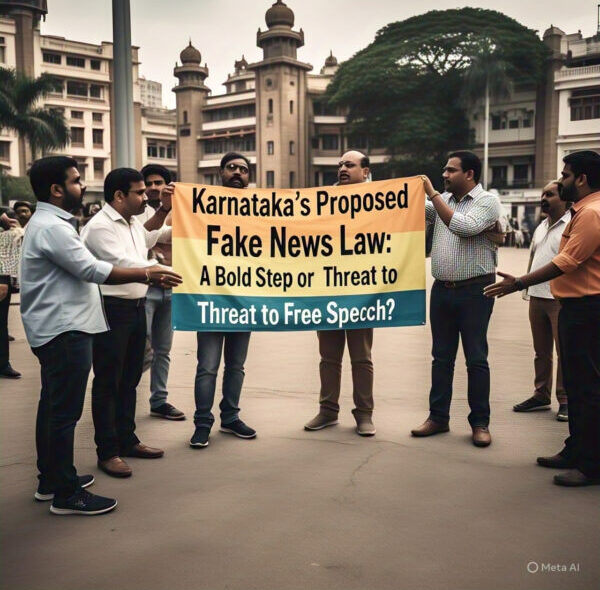Karnataka’s Proposed Fake News Law:
Karnataka is planning a new law to combat fake news online, with a special regulatory body, fast-track courts, and harsh penalties including jail time and fines.
Introduction
The Karnataka government has introduced a draft law aimed at tackling the rising spread of fake news and misinformation on digital platforms. This proposed legislation is one of the most comprehensive efforts by an Indian state to regulate online content, creating a dedicated framework to identify, assess, and penalize misleading information shared through social media and digital channels.
Key Features of the Proposed Law
1. Formation of a Regulatory Authority
A six-member body is proposed to oversee and regulate digital content within the state. The composition includes:
- The Minister for Kannada and Culture (Chairperson)
- One member from the State Legislative Assembly
- One member from the Legislative Council
- Two representatives from social media platforms
- One senior IAS officer, who will act as Secretary
This authority will have the power to review content flagged as fake or harmful, issue takedown orders, and instruct intermediaries such as Facebook, YouTube, and WhatsApp to act against specific posts or accounts.
2. Creation of Special Courts
The draft law also suggests establishing special courts to handle fake news cases exclusively. These courts will:
- Be headed by Sessions Judges
- Focus on fast-tracking hearings and verdicts
- Have the authority to issue binding orders on content and users
- Ensure quicker redressal of fake news-related complaints
This step aims to reduce delays in prosecuting misinformation cases and relieve pressure on regular courts.
3. Harsh Penalties
The proposed legislation recommends severe punishments for individuals or platforms found guilty of spreading or facilitating misinformation. The penalties include:
- Imprisonment for up to seven years
- Fines up to ₹10 lakh
- Offenses categorized as non-bailable and cognizable
Lesser offenses, such as delayed removal of flagged content, may also attract fines of ₹25,000 per day, going up to ₹25 lakh, along with two years of imprisonment.
4. Targeted Content Categories
The law is not just limited to generic misinformation. It explicitly targets:
- Fabricated or manipulated news
- Misleading visuals or videos
- Content promoting superstition
- Insults or threats to women
- Content disrespecting religious beliefs, including the Sanatana Dharma
This indicates the law’s intent to address culturally sensitive topics alongside traditional political or social misinformation.
Why This Law Was Proposed
● Rising Threat of Online Misinformation
Fake news has become a widespread problem, leading to mob violence, financial fraud, and public unrest. Karnataka officials report a growing number of misinformation-related incidents, especially during elections and communal events.
● Gaps in Existing Laws
While laws such as the Information Technology Act and the Indian Penal Code address aspects of online speech, they are often seen as outdated or too slow to deal with fast-moving digital content. Karnataka’s bill aims to close these gaps with a targeted approach.
● Need for State-Level Control
By proposing its legislation, Karnataka seeks more control over how digital content is regulated at the local level, arguing that a one-size-fits-all national approach may not work effectively across diverse states.
Support and Criticism
Supporters Argue:
- The law will help curb the dangerous spread of misinformation that affects public safety.
- Special courts and clear regulatory mechanisms will improve enforcement.
- It sends a strong message that the state will not tolerate digital manipulation or online abuse.
Critics Warn:
- The bill may infringe on freedom of speech and be used to suppress dissent.
- Terms like “fake news” and “insult” are vague and open to interpretation, which could lead to misuse.
- Internet regulation is under the Union List in the Constitution, so the state may lack the authority to enforce such laws.
Legal experts and civil rights groups have also expressed concern that the bill might criminalize satire, opinion pieces, or genuine journalistic work if interpreted too broadly.
Impact on Digital Platforms and Users
If enacted, the bill would have significant implications:
- Social media platforms may be required to set up state-specific content review mechanisms and respond quickly to regulatory orders.
- Content creators and journalists would need to be more cautious in verifying their posts.
- General users could face stricter scrutiny for sharing or forwarding information that is later deemed fake.
Next Steps
The bill is currently in draft form and will be reviewed by the Karnataka Cabinet. If approved, it will be introduced in the State Legislative Assembly for debate. Once passed, the state government will notify the structure of the regulatory authority, appoint members, and set timelines for court formation and enforcement mechanisms.
Conclusion
Karnataka’s proposed anti–fake news law marks a bold move to address a growing digital menace. Its structured approach—with a dedicated regulatory body, legal mechanism, and steep penalties—aims to make accountability in the online world. However, balancing this effort with constitutional rights and ensuring it is not used for censorship will be critical. Whether this law becomes a model for other states or stirs national controversy remains to be seen.
Frequently asked questions
What is Karnataka’s proposed anti–fake news law?
The Karnataka government has drafted a bill to combat fake news on digital platforms. It proposes a six-member regulatory authority, special fast-track courts, and strict penalties—including up to seven years in jail and fines up to ₹10 lakh—for individuals or organizations who spread false or harmful information online.
Why is Karnataka introducing this law?
The state has seen a surge in misinformation leading to public unrest, fraud, and communal tension. Existing national laws are seen as insufficient or slow in addressing these issues, prompting the state to propose its own, more direct framework.

























